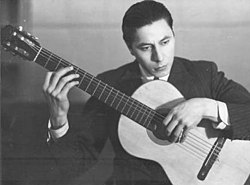Atahualpa Yupanqui
Atahualpa Yupanqui (born January 31, 1908 as Héctor Roberto Chavero in Pergamino , Argentina , † May 23, 1992 in Nîmes , France ) was an Argentine singer , songwriter , guitarist and writer . He is considered the most important Argentine folklore musician of the 20th century.
Life
Atahualpa Yupanqui was born under the real name Héctor Roberto Chavero in Pergamino in the province of Buenos Aires to a Basque mother and a Creole father. At the age of six he began to play the violin and a little later the guitar. His family moved to San Miguel de Tucumán when he was ten years old.
Allegedly he chose the pseudonym Atahualpa Yupanqui as a teenager . Atahualpa was the last ruler of the Inca empire, the addition Yupanqui denotes a person "who will tell something".
At a young age, Yupanqui traveled extensively through northwest Argentina and the Altiplano , studying indigenous cultures . He joined the Communist Party and had to leave the country in 1931 after the failed uprising of the Kennedy brothers. He sought refuge in Uruguay . In 1934 he returned to Argentina.
At the age of 20 he composed his first songs ( Camino de Indio and Nostalgia Tucumana ). Atahualpa Yupanqui first visited the city of Buenos Aires in 1935 , and as his compositions became more popular, he was invited to play on the national radio. Shortly afterwards he met Antonieta Paula Pepin Fitzpatrick , nicknamed "Nenette", who was to become his lifelong companion and who supported him musically under the pseudonym "Pablo Del Cerro".
During the military dictatorship from 1946 to 1949, he was constantly harassed and also imprisoned. In 1949 he left the country and moved to Europe . Édith Piaf invited him to perform in Paris in June of the same year . After that he toured all over Europe.
In 1952 he returned to Buenos Aires. He was expelled for criticizing the Communist Party, which made it easier for him to appear on the radio. However, he was treated with suspicion by the anti- Peronists who came to power after the fall of Perón in 1956.
In the following years Atahualpa Yupanqui lived in his houses in Buenos Aires and in Cerro Colorado in the province of Cordoba . Between 1963 and 1964 he toured Colombia , Japan , Morocco , Egypt , Israel and Italy . In 1967 he toured Spain and settled in Paris. He returned to Argentina regularly, but these trips became increasingly rare from 1976 after Jorge Rafael Videla and his military junta took over power in Argentina. During this time, reporting on Yupanqui was banned in Argentina.
Atahualpa Yupanqui died in Nîmes (France) in 1992 at the age of 84.
Works
Atahualpa Yupanqui's most famous compositions include Viene clareando, El arriero, Zamba del grillo, La añera, La pobrecita, Milonga del peón de campo, Camino del indio, Chacarera de las piedras, Recuerdos del Portezuelo, El alazán, Indiecito dormido, and El Alazán aromo, Le tengo rabia al silencio, Piedra y camino, Luna Tucumana, Los ejes de mi carreta, Sin caballo y en Montiel, Cachilo dormido and Tú que puedes vuélvete .
literature
- Piedra sola (1940)
- Aires indios (1943)
- Cerro Bayo (1953)
- Guitarra (1960)
- El canto del viento (1965)
- El payador perseguido (1972)
- La Capataza (1992)
Quote
“I was born in a village in the Argentine pampas. My mother was Baskin and from her I got my love for freedom. My father was an Indian and a farm worker. He gave me a sense of the silence of the woods and the stones. I take in the plight of the people, the abandonment of people, their pain, which I feel like my own pain. "
swell
- ^ Profile of Atahualpa Yupanqui , accessed April 1, 2012
- ↑ Guitar & Laute 2, 1980, 4, p. 5
- ↑ El Mercurio: Atahualpa Yupanqui a cien años de su nacimiento: el gigante del folclor argentino | Emol.com. January 31, 2008, accessed March 31, 2019 (Spanish).
- ↑ «The junta doesn't want the Beatles» . In: Arbeiter-Zeitung . Vienna June 19, 1978, p. 8 ( berufer-zeitung.at - the open online archive - digitized).
- ↑ quoted from: Mareike Lühring, "Portrait Atahualpa Yupanqui" in: Between Revolution and Revolte: 1968 in Latin America. Books, Pictures and Movements, brochure accompanying the exhibition at the Ibero-American Institute, June 14 - July 31, 2008 , p. 34
See also
Web links
- Profile of Atahualpa Yupanqui , English
- The Voice of Latin America ( Memento of September 26, 2007 in the Internet Archive )
- Atahualpa Yupanqui on www.geocities.com ( Memento from August 4, 2002 in the Internet Archive ) (Spanish)
- Works by and about Atahualpa Yupanqui in the catalog of the German National Library
| personal data | |
|---|---|
| SURNAME | Yupanqui, Atahualpa |
| ALTERNATIVE NAMES | Chavero, Héctor Roberto (maiden name) |
| BRIEF DESCRIPTION | Argentine singer, songwriter, guitarist and writer |
| DATE OF BIRTH | January 31, 1908 |
| PLACE OF BIRTH | Pergamino , Argentina |
| DATE OF DEATH | May 23, 1992 |
| Place of death | Nîmes , France |
